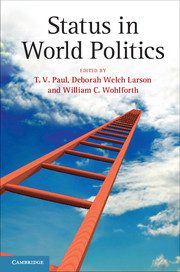Book contents
- Frontmatter
- Contents
- Figures
- Tables
- Contributors
- Acknowledgments
- Part I Introduction
- Part II Admission into the Great-Power Club
- 2 Managing Rising Powers: The Role of Status Concerns
- 3 Status Considerations in International Politics and the Rise of Regional Powers
- 4 Status Is Cultural: Durkheimian Poles and Weberian Russians Seek Great-Power Status
- Part III Status Signaling
- Part IV International Institutions and Status
- Part V Status, Authority, and Structure
- Part VI Conclusions
- Index
- References
3 - Status Considerations in International Politics and the Rise of Regional Powers
Published online by Cambridge University Press: 05 June 2014
- Frontmatter
- Contents
- Figures
- Tables
- Contributors
- Acknowledgments
- Part I Introduction
- Part II Admission into the Great-Power Club
- 2 Managing Rising Powers: The Role of Status Concerns
- 3 Status Considerations in International Politics and the Rise of Regional Powers
- 4 Status Is Cultural: Durkheimian Poles and Weberian Russians Seek Great-Power Status
- Part III Status Signaling
- Part IV International Institutions and Status
- Part V Status, Authority, and Structure
- Part VI Conclusions
- Index
- References
Summary
The salience of major powers and the status they are attributed in international politics have been of central concern to both scholars and practitioners. The focus on major powers is at least as old as Thucydides, who noted in the Melian debate the unique advantages these states possessed in structuring relations between states. More recently, realists, neorealists, long-cycle theorists, hierarchical theorists, power transition theorists, and liberal institutionalists have all focused on major powers as critical to ordering interstate relations, as well as attempts to change those orders.
One aspect of being a major power is the status one receives from the policy makers of other states. The attribution of status to major powers – separate from their capabilities – has stubbornly persisted in significance across empirical conflict models, appearing as a predictor of conflict initiation, alliance formation and membership, involvement in militarized interstate disputes (MIDs) and crises, and multilateralism. Such status attribution, as both international relations (IR) scholars and historians have long recognized, is not a mirror reflection of the capabilities of these powers. Italy and Austria-Hungary are two clear historical cases of states that continued to receive high status attribution long after they no longer had the capacity or the willingness to act as major powers.
- Type
- Chapter
- Information
- Status in World Politics , pp. 58 - 84Publisher: Cambridge University PressPrint publication year: 2014
References
- 34
- Cited by



